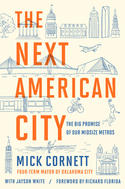One trend we’ve seen in many domains is the bifurcation of society into two tiers, the successful and unsuccessful. One way we see this divergence playing out is between cities in the same state. This NBC article looks at divergence in Ohio between Dayton and Columbus. read more »
Small Cities
“Middle America” in America’s Urban Century
In the late 1990s and the early Aughts, when the last Gen Xers and the first Millennials were launching into their adult lives, “Urban America” was a very different place. On many fronts, the choices young ambitious graduates had were fast becoming limitless, save on one key front: the cities where they could reasonably want to live. read more »
- Login to post comments
The Unbearable Sameness of Cities
The person who sent me Orianna Schwindt’s New York magazine piece on the “unbearable sameness of cities” asked if I had written it under a pen name. Indeed, she hits so many of my themes about American cities: read more »
Northern Cities Need to Ramp It Up on Attraction
The Economist just ran a nice article on “the flourishing Midwest.” Milwaukee in particular gets singled out for some favorable coverage, so congratulations to them.
Many Midwest cities have been doing well. Even the ones with poor headline numbers like Cleveland are seeing areas of strength when you look at a finer grained level. Some of the declines Midwest locations are experiencing are a result of the overhang of previous decline. Change and restructuring is happening in many places. read more »
- Login to post comments
The Great Re-homing: Why People Are Moving Back To Their Hometowns To Start Small Businesses
I have my gas station diet down pat. Coffee, water, bananas, nuts, hard-boiled eggs, and the occasional peanut butter cup indulgence. Ok, sometimes I also eat beef jerky. You have to learn these things when you spend 10,000 miles on the road talking to small business owners for a podcast. read more »
- Login to post comments
Restoring Localism
Americans are increasingly prisoners of ideology, and our society is paying the price. We are divided along partisan lines to an extent that some are calling it a “soft civil war.” In the end, this benefits only ideological warriors and their funders. read more »
- Login to post comments
Louisville’s Urban Bourbon Movement
As a spirt, bourbon is heavily associated with the state of Kentucky. But while major spirits firm Brown-Forman is located in Louisville, traditionally bourbon was distilled in rural – and ironically, dry – counties like, say, Bourbon County. read more »
- Login to post comments
Partners in Transit: Agencies team up with Lyft, Uber
Many public transit agencies are struggling to sustain lightly-used routes as passenger traffic dips in response to relatively cheap automobile fill-ups, a rise in work-from-home lifestyles, and the growing popularity of transportation network companies (TNCs), such as Lyft and Uber. The brunt of the decline has been sharpest in small and mid-size communities, where some bus services are infrequent, follow meandering routes, and stop running after peak hours. read more »
- Login to post comments
Millennials Reinvent Localism in Their Search for Community
It’s common knowledge that millennials long for "community." What’s less understood is the concrete expression of that longing in cities and suburbs across America, especially now that the older tier of millennials between ages 28 and 34 are buying homes, starting companies, running for office, and throwing around their consumer weight. read more »
- Login to post comments
Iowa’s Next Election: Bridging the Urban-Rural and Class Divide
My home state of Iowa famously gave Barack Obama a convincing victory in the Democratic caucuses in 2008, the first triumph that launched a young U.S. senator from Illinois to become the first African-American president. Obama ultimately won two terms, and each time Iowans favored him by considerable margins. Iowa was also one of several Midwestern states that famously flipped to support Donald Trump in 2016. read more »
- Login to post comments






















